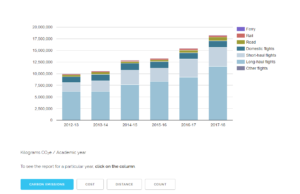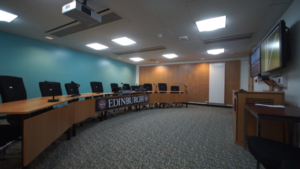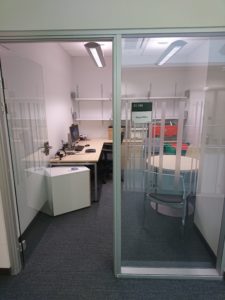Climate conscious travel: what is the University doing?

In the first of two new blogs on climate conscious travel, SRS Projects Coordinator Siôn Pickering asks why travel is an environmental problem, uncovers the scale of business travel at the University of Edinburgh, and discusses how the University is reducing its business travel emissions to lessen its impact on the environment.
What is the problem?
The number of business travel journeys at the University has grown by over 50% since 2012-13. In part this is because the University has grown (a 20% increase in student and staff numbers since 2012/13) which makes sense – more people means more travel. However the distance travelled per staff member has also increased in this time. This means that, on average, each member of staff is travelling more, spending more budget on travel, and as a result, creating more emissions linked to University business.
You may be asking “Why is this important? Travel is essential to increasing our global reach”. We agree, in some ways more travel is good for the University. It allows us to collaborate with other institutions and helps us to publish more academic papers. In turn this raises the profile of the University and showcases us as a world-leading institution for learning, teaching, and research.
But this is not always the case. More travel does not necessarily mean more collaboration, more research, or more learning. A recent study by the University of British Columbia (UBC) shown that an increase in academic travel does not equate to more academic publications (Wynes et al., 2019). We have yet to complete a similar examination in Edinburgh, but other unpublished studies have confirmed similar relationships at other Universities.
You may already be aware that the University aims to become net-zero carbon by 2040 as outlined in our 2016 “Zero by 2040” Climate Strategy. Addressing emissions from business travel is crucial to achieving this goal. Yet currently travel emissions are growing rapidly, undoing the reductions seen from actions tackling other emissions.
What are we doing?
Since 2016, the Department for Social Responsibility and Sustainability have been working to address business travel emissions. We started by looking to better understand our travel. To do this, we have developed a tool – our Business Travel Report – that helps to automatically calculate the carbon emissions from our 95,000+ annual journeys. By better understanding our travel, we can now talk to staff and students to show the magnitude of the challenge ahead of us.

By publically displaying this data online, we hope to increase the transparency of this topic with the view of starting conversations across the University, and beyond.
And it’s working.
Not only are staff and students approaching us to find out more about University business travel emissions, and what actions can be taken on an individual level to reduce these emissions, we are starting to work with a number of global institutions to tackle the problem. Because of this we have developed the Roundtable of Sustainable Academic Travel, where institutions can share knowledge on the topic of business travel in higher education. With over 75 institutions signed up to date, there is clearly an appetite for change within the sector.

A video conferencing suite in the Main Library
Within the University, we are starting to hear of individual groups taking innovative steps to reduce business travel emissions. This includes adapting local guidance to promote low carbon alternatives, introducing virtual elements to international conferences, and installing private spaces for staff and students to communicate to colleagues and collaborators virtually. We are working with these individuals to make this good practice normal across the University.

A video conferencing suite in the Roslin Institute
In 2017 and 2018 we held a series of focus groups across academic schools and professional departments, and in 2019 we collected survey responses from certain academic schools. The aim of this research was to understand why travel took place at the University. Some responses were not unsurprising. Travel took place to: share knowledge at conferences, collaborate with colleagues at linked institutions, and build relationships in a chosen field. All great reasons to travel on behalf of the University.
But (and there is always a but), participants also noted that travel was physically and mentally draining because of long journeys, lack of opportunity to exercise, and a loss of natural rhythm due to crossing multiple time zones. Travel impacted on personal lives, contact with family was greatly reduced, and travellers reported having to miss out on key family events because of travel. Stress levels increased upon their return as workloads were not distributed to colleagues while travelling, meaning that travellers returned with a greater workload than before they went away.
All of these are not great outcomes from travel, for the individual or the institution.
What’s next?
We are now starting to promote the concept of “Climate Conscious Travel”. Climate Conscious Travel is our way of saying that we understand that some travel is essential. But Climate Conscious Travel also acknowledges that some journeys taken on behalf of the University could be adapted to reduce the associated carbon emissions. It is this travel that we are looking to address.
Not only will addressing this travel save us carbon, there is also the potential to reduce the financial costs as well as increase the health and wellbeing of our staff and students. By reducing the perception that travel is essential, we see this as assisting the University in becoming more inclusive and diverse. Reducing travel will also free up staff time to undertake more research. It is true that it is possible to work while travelling but feedback from our focus groups showed that often this work was not as productive as if they had been in the office instead. We estimate that, in 2017-18, University travellers spent over 155,000 hours in transit by air and rail alone (excluding time spent travelling to a station or airport, or the time to process through security or wait at a gate etc.). This is equivalent to 100 staff working full time at the University, for a year.
What can you do?
If you would like to find out what you can do to become a Climate Conscious Traveller, read my second blog.





Recent comments